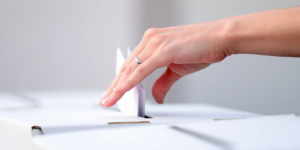Who’s in charge of government when an election is called?
 The Canadian Monarch must always have advisors. As a result, the Prime Minister and his or her Cabinet remain in office, able to react to global events or address domestic emergencies. But during an election the actions of Ministers are also confined by the “Caretaker Convention.”
The Canadian Monarch must always have advisors. As a result, the Prime Minister and his or her Cabinet remain in office, able to react to global events or address domestic emergencies. But during an election the actions of Ministers are also confined by the “Caretaker Convention.”
Caretaker Convention
In Canada, the “Caretaker Convention” requires the elected executive to act with restraint during an election. That “restraint” does not mean that government is prohibited from making decisions during the caretaker period. However, convention dictates that government activity should be restricted to matters that are:
Routine, or non-controversial, or urgent and in the public interest, or reversible by a new government without undue cost or disruption, or agreed to by opposition parties (in those cases where consultation is appropriate).[1]
During this period Cabinet Ministers remain in contact with the Deputy Minister to provide direction to the department when circumstances demand. In the absence of any of the exceptions above, Ministers will defer policy decisions, new spending, and government announcements. Cabinet operations are normally curtailed during an election, with Cabinet and its committees meeting only as necessary to deal with essential items.
The caretaker period begins when Parliament has been dissolved by the Governor-General. It ends when either an election result returning the incumbent government is clear or when a new government’s Ministers take their oaths of office.
Carleton University’s Philippe Lagassé, a noted expert in the roles of Parliament and the Crown in Westminster States, wrote the following for Policy Options:
“The words chosen by [the Privy Council Office in its description of the caretaker convention] are important. A caretaker ministry should restrict itself. The agreement of opposition parties is to be sought where appropriate. These aren’t weasel words. They reflect the actual meaning and operation of the convention. The caretaker convention is ultimately grounded in a principle of restraint, not a prohibition of action. It is a convention that relies on prudential judgement rather than absolute constraints…
In making… determinations, ministers will be assisted by their deputies, and the prime minister by the Clerk of the Privy Council. These officials will remind ministers of the norms that surround the caretaker convention. But these senior bureaucrats do not, and cannot, supplant ministers. Ministerial responsibility, the keystone of Canada’s system of responsible government, does not dissipate during the caretaker period.”[2]
Ministerial Action During the Caretaker Period
There are numerous examples of Ministers carrying out their duties during an election period. For example:
- In 2004, Prime Minister Paul Martin represented Canada at the G7/8 meeting during the caretaker period, eliciting concerns that it distracted from the election campaign and raised his profile.
- In November 2006, the Liberal government lost a confidence vote and an election called for the following January. At the time of Parliament’s dissolution, Environment Minister Stéphane Dion was chairing the UN Climate Conference in Montreal and continued to do so in the caretaker period.[3]
- In the final days of the 2008 election, Finance Minister Jim Flaherty attended the G7/8 Finance Ministers meeting in Washington where “Canada pledged to do whatever necessary to prop up the international financial system”[4] during the unfolding financial crisis.
Logistically, a skeleton political staff will remain on duty during the writ period while most ministerial advisors are on leave to support their party’s election campaign. If there is urgent need to connect with Ministers during the election period, there are two entry options:
- Ministers continue to fulfill their duties and will retain one or more exempt staff in the office to ensure the continuance of necessary government business. This staff is typically more senior and empowered in departments that react to global events and emergencies (ie, Defence, Global Affairs, Public Safety, etc).
- One or more senior staff members from the Prime Minister’s office will remain in place to ensure the government’s responsibilities are met during this period, along with several other junior members of the PMO staff.
[1] https://www.canada.ca/en/privy-council/services/publications/guidelines-conduct-ministers-state-exempt-staff-public-servants-election.html
[2] https://policyoptions.irpp.org/2015/10/09/clarifying-the-caretaker-convention/
[3] https://nationalpost.com/news/politics/restraint-is-the-watchword-what-a-caretaker-government-can-and-cant-do-during-an-election
[4] https://www.thecanadianencyclopedia.ca/en/article/jim-flaherty